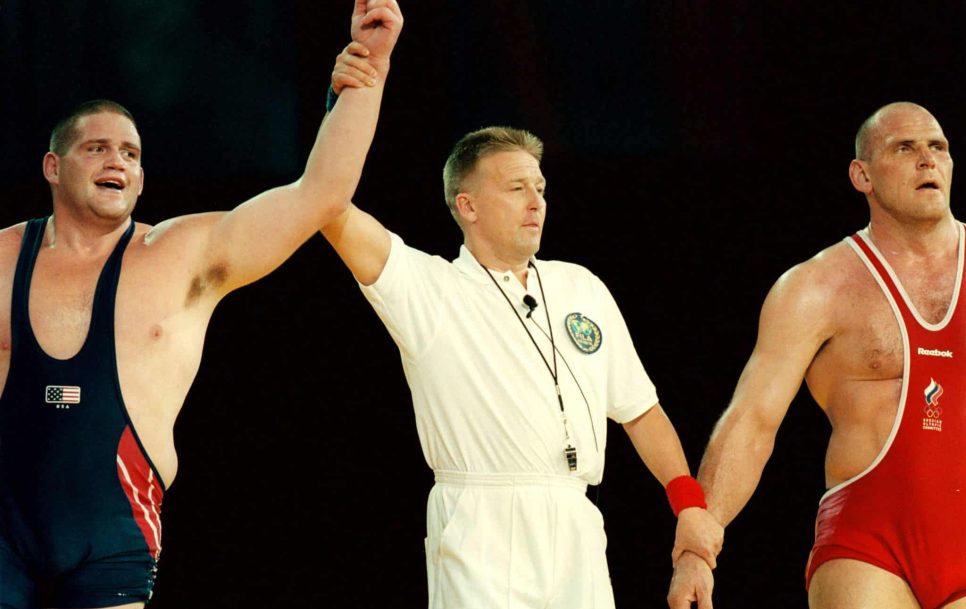Olympic icons: How a dairy farmer beat the invincible
The nicknames “Russian King Kong,” “Alexander the Great,” and “The Crane from Novosibirsk” give a hint of Aleksandr Karelin’s power and success. The wrestler from Siberia dominated championships for over a decade before meeting Rulon Gardner in the 2000 Sydney Olympic final.
Of course, history has seen its fair share of athletes who can hold their field in an iron grip for years. However, Karelin is a highly extraordinary example.
Let’s start with some more straightforward statistics. Karelin won three consecutive gold medals in Greco-Roman heavyweight wrestling—men can weigh up to 130 kg—and went to Australia for a fourth. He also won 12 consecutive European Championships and nine consecutive World Championships.
Statisticians disagree on how many matches Karelin wrestled during his career. For example, 889 has been suggested, but Russian media have mentioned 887. There is consensus that the giant born in Novosibirsk lost only two matches: first to his compatriot, then-reigning European champion Igor Rostorotski, at the 1987 Soviet Union Championships; 13 years later, it was Gardner’s turn.
More astonishing than Karelin’s long winning streak might be that the last point scored against him before the Sydney Olympics was in 1993. Or in 1994, depending on whom you believe.
Gardner didn’t come out of nowhere
While Karelin went to Sydney as the overwhelming favorite, Gardner, a simple country boy, did not. His parents were Mormons and ran a dairy farm. The American’s journey to becoming an Olympic champion began at home, where he wrestled with cows to get in shape.
At the same time, it would be wrong to claim that Gardner came out of nowhere. Sure, he had no significant victories, but he won the Pan American Championships twice before the Olympics. Considering the solid level of U.S. and Cuban wrestlers, these victories were undoubtedly all right.
The two giants first met in the semifinals of the 1997 World Championships, where Karelin left the mat with a 6:0 victory. Both started very well in Sydney, defeating all their opponents in the group stage. Karelin wrestled twice, Gardner thrice.
While Karelin fought to the final without conceding a point, Gardner had a tough time defeating Israeli representative Yuri Evseitchik, born in Ukraine, in the semifinals. The American won 3:2 in overtime, and reports say that while Gardner shone with stamina, Evseitchik was utterly exhausted by the end of the match.
In the gold medal match, Karelin wanted to settle the score in the first half, trying to pin Gardner with his signature lift. Although the Russian was immensely strong and extremely agile for his size, he couldn’t get the American down. They went into the break at 0:0, with another three-minute half awaiting the giants.
Karelin made a massive mistake in the second round as the two wrestlers grappled for superiority. While both men locked their arms around each other, Karelin broke his lock first. This seemingly insignificant movement brought into play a recent rule change that meant the USA’s Gardner was awarded a point to lead 1:0.
The rules of Greco-Roman wrestling are that if the two-round bout ends with one person leading by only a point, the match goes to overtime. And so the Sydney 2000 final moved onto a nail-biting three minutes of action that would decide the Olympic gold medallist.
Again, Karelin tried his signature move, but Gardner did not succumb to his opponent’s will. The invincible Russian eventually tired and couldn’t trouble Gardner in overtime. Thus, in his 887th or 889th match, Karelin suffered only his second loss. Gardner, who had fought like David against Goliath, was crowned Olympic champion.
“For fifteen years, all the heavyweights were tormented by only one question: how to defeat the Russian Bear? They thought, but they never came up with anything. I thought about it in Sydney, too. Of course, I didn’t find an answer either. But I realized my only chance was to be patient and try to tire Karelin, make him tired. It seems I succeeded,” said Gardner.
Although the Russians initially tried to protest the result, Karelin accepted the loss. “I cried, too. But no one saw it,” the giant said, referring to the fact that he showed no emotion after his defeat.
Karelin left his shoes on the mat
Although Gardner continued to find success later, the pinnacle of his career came in Sydney. A year later, he won his first and only World Championship title. He then dealt with various injuries but still managed to win Olympic bronze in Athens in 2004.
With that, his wrestling career effectively ended. Gardner held one MMA fight that he won, helped cover the wrestling tournament at the Beijing Olympics as an expert, and tried to make a comeback for the 2012 London Games but was left out of the U.S. trials due to excessive weight.
However, the extremely hardworking Karelin’s career ended in Sydney. After losing to Gardner, he left his wrestling shoes on the mat, signaling that he would never return.
While Karelin has gone down in history as the most dominant athlete of all time in men’s heavyweight wrestling, one man’s Olympic achievements surpass those of the Russians.
That man is Mijaín López. This year at the Paris Olympics, he became the first athlete to win five consecutive Olympic golds in a single sport. Four years from now, in Los Angeles, American swimmer Katie Ledecky, who has had no equal in the 800-meter freestyle at four consecutive Olympics, could join him.







